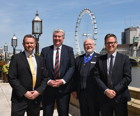CABE members vote to apply for Chartered status

The Chartered Association of Building Engineers (CABE) has today announced it will go ahead with its application to become a licensed member of the Engineering Council.
This decision comes following a successful members’ vote with 91% in favour of the move. Licensed Member status would pave the way for CABE members to be formally eligible for Chartered Engineer status on equal terms with other engineering professional bodies.
Formed in 1925 as the Incorporated Association of Architects and Surveyors, the Chartered Association of Building Engineers (CABE) is a leading body for professionals specialising in the design, construction, evaluation and maintenance of buildings.
Its members practise across the UK, mainland Europe and around the world, and work in both the private and public sectors.
Dr Gavin Dunn, CEO of CABE said: “This clear mandate for change puts CABE within touching distance of the industry top table and gives recognition of building engineering as a defined engineering discipline in its own right, both in the UK and internationally.”
This will enable the association to maintain the existing title Chartered Building Engineer and enable members to pursue the additional CEng qualification if they wish.
They will also have a clear and defined route to gain international recognition.








